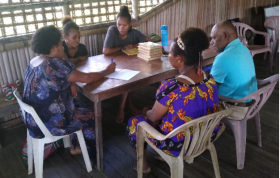
In February 2024, a Rapid Word Collection (RWC) workshop was conducted in Sandaun Province, Papua New Guinea (PNG) for the Abau language. The primary goal of the workshop was to add at least 1,000 new words to the existing Abau database. The workshop was facilitated by SIL Papua New Guinea’s LingCrop (Linguistics Consultant Resourcing of PNG) team, comprising four national trainees and three expat mentors. A total of 23 Abau speakers took part in the RWC workshop.
The Abau participants were divided into five word-collection groups, each with a member of the LingCrop team who served as leader (who read the English questionnaire and explained its meaning to the other group members) and a combination scribe/glosser (who wrote the Abau words and their Tok Pisin and English meanings). The collected words were handwritten in an exercise book, with columns for Abau, Tok Pisin, and English, as well as a final column where a checkmark could be added to indicate that the information had been entered in the database.
The methodology used in this RWC workshop diverged somewhat from the standard. The semantic domain questionnaire that is available from the Resources page of this website and also distributed with FieldWorks Language Explorer (FLEx) was used as the means of eliciting vocabulary, but no effort was made to preserve the number or name of the semantic domain where each item was elicited. The typists looked up each word that was collected to see if it was in the database or not, and if it was not there, they added it, using WeSay. If it was already there, they moved on to the next word collected.
There were seven days of word collection, with half of the first one devoted to training. A total of 4,480 words were collected, adding 1,887 new entries to the Abau database, growing it from 3,053 to 4,930, an increase of 62%. Comments by participants at the end of the workshop were largely positive, highlighting the fact that it had caused them to think of words in their vernacular that they had forgotten. Many participants also stated that they had learned new words in their own language; they realized that, for certain concepts, they had become accustomed to using Tok Pisin vocabulary in place of Abau.
